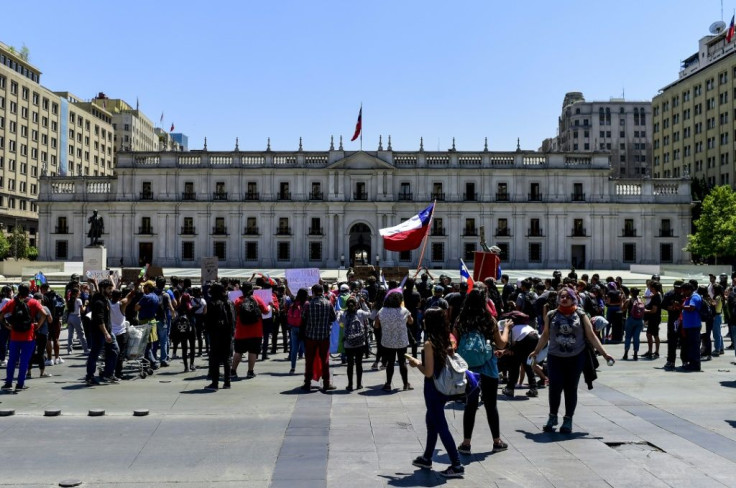New Clashes As Embattled Chile President Reshuffles Cabinet

Chilean protesters clashed with security forces on Monday, several hours after embattled President Sebastian Pinera announced a cabinet reshuffle in his latest bid to end 10 days of street demonstrations.
At least 20 people have died in a wave of protests against social and economic inequality ahead of the latest violence in Santiago and, according to local media, the cities of Valparaiso and Concepcion.
"Chile has changed and the government too has to change to confront these new challenges in these new times," said Pinera, who replaced a third of his cabinet, including highly unpopular Interior Minister Andres Chadwick.
Protesters have been demanding Pinera's resignation as anger over low wages and pensions, expensive health and education, and a growing gap between rich and poor fueled the country's worst civil unrest in decades.
Clashes between protesters and police later took place in central Santiago, not far from the presidential palace, as a peaceful rally of several thousand people gradually gave way to violence.
Some shops were looted, and a fire tore through a building housing a shopping center, several shops and a hotel, recalling the violence that erupted in the early days of the protests that broke out on October 18.
Workers at Escondida, the world's biggest copper mine, will start a 24-hour strike from Tuesday in support of the protests, a mining union said in a statement.
A week-long state of emergency that had seen 20,000 police and soldiers deployed on the streets ended at midnight going into Monday.
'Get up earlier'
On Saturday, Pinera canceled nighttime curfews that had begun a day after violent protests broke out.
Finance Minister Felipe Larrain, who was among the axed cabinet members, came under fire last month for recommending that "romantics" buy flowers, after announcing that inflation hadn't risen and they were even cheaper.
Also on the way out was Economy Minister Andres Fontaine, who fell afoul of public opinion when he advised disgruntled workers to "get up earlier" to avoid an increase in peak hour metro prices.
The three percent rise was the spark that triggered the worst political violence Chile has seen since it returned to democracy after the Augusto Pinochet dictatorship from 1973-1990.
Former Santiago governor Karla Rubilar, who was praised for her sympathetic reaction to protesters, has been made minister for the general secretariat of the government.
Pinera announced plans for the cabinet overhaul on Saturday, his third reshuffle in 15 months.
Last week, he offered a raft of measures aimed at calming the public ire, including a hike in the minimum wage and pensions, some reductions in health care costs and a streamlining of parliament.
Speaking at the presidential palace on Monday, Pinera said that "these measures won't solve all our problems but they are an important first step."
"They reflect the firm will of our government and the strong commitment of each of us in favor of a socially more just and equitable Chile," added Pinera, a wealthy businessman who was elected to a second term in March 2018 after having previously served as president between 2010 and 2014.
Despite his attempts to appease the masses, Pinera's approval rating has dropped to 14 percent.
© Copyright AFP 2024. All rights reserved.





















